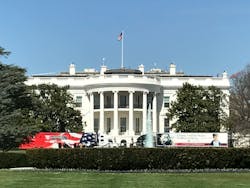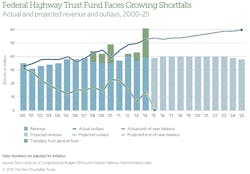With potentially conflicting campaign promises to lower taxes and to come up with a trillion dollars to upgrade the nation’s infrastructure, President Trump on Monday acknowledged the trucking industry’s concern over the deteriorating condition of highway system—and he opened the door to raising the federal tax on gasoline and diesel for the first time in almost 25 years.
“It’s something that I would certainly consider,” Trump said Monday in a wide-ranging interview with Bloomberg News in the Oval Office, “if we earmarked money toward the highways.”
The president met with truckers, represented by the American Trucking Assns., at the White House in March. ATA has been a staunch supporter of an increase in user fees, specifically in fuel taxes, to cover the growing shortfall in the fuel-tax based Highway Trust Fund. The new administration has promised a massive infrastructure program to be funded by a combination of taxpayer revenue and private investment.
"As an industry that pays half of the tab that funds the Highway Trust Fund, we welcome a discussion around tax reform and how best to generate the additional revenue we need to improve our roads and bridges so we can continue to safely and efficiently move 70% of the nation's freight," said ATA spokesman Sean McNally, referring to the Bloomberg interview.
Fuel taxes have not been raised since 1993, as vehicles have become increasingly fuel efficient and construction costs have climbed rapidly. Tax-shy lawmakers have authorized transfers from the General Fund to make up the difference at the federal level since 2008, while legislatures have summoned the political will to increase fuel taxes at the state level for road programs.
But in a daily briefing later Monday, White House Press Secretary Sean Spicer emphasized the president’s comments “did not express support” for a fuel tax increase. Trump listened "out of respect" to the trucking industry's explanation of the cost to the economy of crumbling, congested roads.
“That’s it. There was no endorsement of it,” Spicer said. “People ask the president all the time to consider policy, and he has an open mind.”
Regarding the timeline for releasing the administration’s infrastructure plan, Trump is “a little busy” with a health care program, tax reform, and the federal budget, Spicer noted.
“It’s clearly still up there on the priority list, but let’s get through this week and hopefully we’ll have some additional details,” Spicer said. “He’s been very clear that an infrastructure package is something he wants to get done and get moving.”
Indeed, House and Senate negotiators on Sunday finalized a consolidated appropriations bill for 2017 to be voted on this week. The latest extension of the 2016 budget expires Friday. The new package includes $500 million for TIGER Grants, matching the 2016 funding of discretionary infrastructure investment managed by the Dept. of Transportation.
The budget for the Federal Motor Carrier Safety Administration comes in at $644 million, short of the agency’s 2017 request of $794 million. The plan would, however, fully fund state-managed commercial vehicle enforcement programs at levels set in the FAST Act. Various programs, because of a technical error, were not funded in the extended 2016 budget while money was directed to other programs which no longer existed.
The 2017 budget does not include a provision, sought by ATA, which would preempt state labor laws—such as meal and rest break requirements—in the case of interstate truck drivers.
“We are obviously disappointed the omnibus funding bill did not include language addressing this important issue by clarifying that the Federal government—not individual states—may regulate the hours-of-service of interstate drivers,” McNally said. “ATA is, however, encouraged by the Congress’ continued bipartisan interest in addressing this critical matter for the trucking industry. We will continue to look for opportunities to advance a solution to this issue as part of our pro-trucking, pro-safety, pro-efficiency agenda.”
About the Author
Kevin Jones 1
Editor
Kevin has served as editor-in-chief of Trailer/Body Builders magazine since 2017—just the third editor in the magazine’s 60 years. He is also editorial director for Endeavor Business Media’s Commercial Vehicle group, which includes FleetOwner, Bulk Transporter, Refrigerated Transporter, American Trucker, and Fleet Maintenance magazines and websites.

